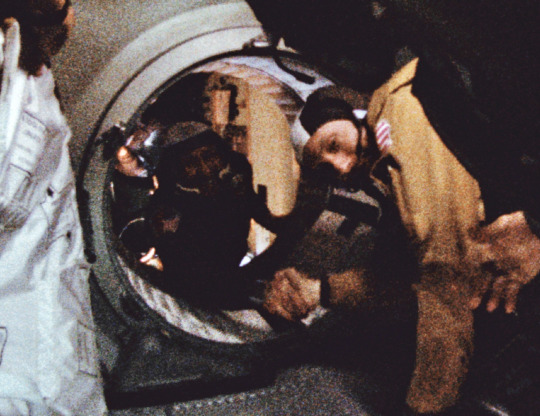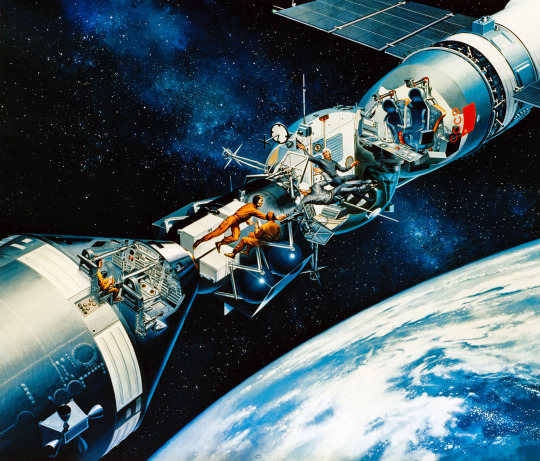#советская космическая програма
Explore tagged Tumblr posts
Text
I'm just gonna say it: I have very mixed feelings about the Soviet Union.
On the one hand, the Soviet Union has been a special interest of mine since I was about sixteen and I love learning about Soviet history, especially regarding the Soviet space programme but also just things about the way people lived. I love Soviet music and the few Soviet movies I've seen. As something of a leftist I like how the Soviet Union made advances in education and worker's rights that were only possible in a socialist system. Soviet women had rights long before women in capitalist countries did. I find the ethos of the Russian dreamers of the early Soviet Union quite inspirational. As I'm applying for jobs I've caught myself wishing I lived in the USSR and could just be assigned a job upon finishing my degree. I also unironically want to live in a society where jeans are banned.
But I know I wouldn't last a day in the Soviet Union, and ultimately I'm glad that the Soviet Union collapsed because it meant the end of oppressive Russian imperialism in Ukraine and the Baltics (at least for some time). Stalin was an asshole who attempted multiple genocides: against the Ukrainians, the Crimean Tatars, the Jews. Arguably Stalin's genocide against the Ukrainians influenced modern-day Russia's genocide against the Ukrainians. Soviet antisemitism still kills Jews today, since the Soviet Union was behind the creation of Palestinian nationalist groups. Overall, despite everyone officially being equal, there was a lot of racism against anyone who wasn't ethnically Russian. So many people suffered under the gulag system, which was not what internet slavaboos would have you think it was. So many people lived meaningless lives, no different than their counterparts in capitalist countries. And although the Russian Empire was an oppressive empire that one should not long to return to, the Soviet determination to put it on the ashpile of history killed the few good things that came out of the Russian Empire: the literature and philosophy, a prominent vegetarianism movement that was denounced as bourgeois, the Mir commune which was an actual communist community.
Why am I saying all of this about a long extinct country that no one in my family ever lived in? I just be like that.
#rant#history#ussr#communism#socialism#feminism#ukraine#jumblr#palestine#Israel#gulag#stalin#anti capitalism#philosophy#советская космическая програма#ссср#россия#комунизм#мир#российская ��мперия
29 notes
·
View notes
Text
Note that 'Sputnik' is just the Russian word for satellite, which literally means 'fellow traveller' and is also used in the context of a travelling companion.
Love the contrast between the Americans’ “Apollo” and the Soviets’ “Sputnik.” You got the Americans naming their rocket after a Greek god trying to communicate the grandness and importance of this rocket. And you got the Soviets naming their rocket “fellow traveler.” Like a friend you go on an adventure with together. This rocket is our little friend lol
105K notes
·
View notes
Text
This year my favourite Jewish holiday (Pesach seder) and my favourite secular holiday (Cosmonautics Day, aka Yuri's Night) will coincide and I want to try and acknowledge that in some way but:
What would I even do?
I live alone in a small flat so I can't host a seder myself (unless I don't get invited anywhere for the first seder and have to do a solo seder, but I hope that doesn't happen), so whatever I do that night will be largely out of my control.
6 notes
·
View notes
Text
I really liked this article. Perhaps one day I'll be able to go to the Moscow Design Museum.
#history#art#retrofuturism#futurism#wonderful future#ussr#space exploration#rockets#moon#луна#космонавт#константин циолковский#циолковский#исскуство#ретро#ссср#россия#техника молодежи#космос#советская космическая програма
3 notes
·
View notes
Note
🌿 🥀?
🌿: name a part of the history of a place that speaks your target language that really interests you
I’m interested in Soviet history and especially the Soviet space program (which is the reason I wanted to learn Russian in the first place).
🥀: if you could move to a place where your target language is spoken, would you? where?
I hoping to move to a new country after I finish undergrad, and am honestly considering Spain. There isn’t any other country where my target language is spoken that I’d consider a move to in the next few years, but I might decide to move to another such country in the distant future.
2 notes
·
View notes
Photo
It looks like a Soviet space poster, but with no words.

617 notes
·
View notes
Photo

1 note
·
View note
Conversation
Konstantin Tsiolkovskii: Мы уехам вместе
Robert Goddard: We're heading for Venus...maybe they've seen us
Wernher von Braun: I guess there is no one to blame
Sergey Korolëv: Это последный обратный отсчёт!
#silly#rocket science#music#tsiolkovskii#goddard#robert goddard#wernher von braun#tw peenemude#sergei korolyov#i didn't even realize final countdown was a space song until recently#циолковский#константин циолковский#сергей королёв#советская космическая програма
1 note
·
View note
Text
Is that Korolyov with Gagarin?

"Gagarin and Tereshkova" by Nikolai Gorshkov (1974)
#art#ussr#советская космическая програма#юрий гагарин#валентина терешкова#космонавт#ссср#ретро#science#сергей королёв#главный конструктор
271 notes
·
View notes
Photo

2 notes
·
View notes
Photo

Rocketry political compass
0 notes
Link
Смотрите!
#константин циолковский#россия#советская космическая програма#tsiolkovskii#only in russia can a rocket scientist be our everything that's one of many reasons i'm learning this language
0 notes
Text
It still messes me up that they shook hands across the threshold.


July 17, 1975: Americans and Soviets shake hands in space during the Apollo-Soyuz mission.
494 notes
·
View notes
Text
Is this really sputnik cosplay, or is it just an avante-garde outfit?

#cosmism#retrofuturism#avante garde#советская космическая програма#ссср#космизм#ретро#fashion#спутник
225 notes
·
View notes
Link
It's interesting how much Star Trek was influenced by cosmism and the socialist futurism of the 60s, especially when many of the details of the post-scarcity society of Star Trek were only fleshed out in the movies and next generation, which came out in the 80s.
Although the post-scarcity society and lack of hierarchies based on race, gender or class can be seen in the original series, that series is also very cold war, pro-capitalist. A common theme in the original series is that it's better to deal with the harsh realities of existence than to live in a utopia which could go wrong or make people complacent, which I later learned was an American cold war response to communism. Also we do see people using money in the original series, even though they have replicators so it's pointless.
If Wells had been less skeptical of Communism and joined the party, he wouldn’t have been the first sci-fi or futurist thinker to do so. Alexander Bogdanov, an early political rival of Lenin’s, wrote “Red Star,” a utopian novel about a Communist colony on Mars where everything was held in common and life spans were greatly extended through the use of parabiosis, the mutual sharing of blood. Along with Anatoly Lunacharsky and Maxim Gorky, Bogdanov proposed a program of “God Building,” which would replace the rituals and myths of the Orthodox Church through creation of an atheistic religion.
For his part, Gorky was a fan of the Cosmism of Nikolai Fyodorov and Konstantin Tsiolkovsky, a scientific and mystical philosophy proposing space exploration and human immortality. When Lenin died four years after meeting with Wells, the futurist poet Vladimir Mayakovsky’s line “Lenin Lived, Lenin Lives, Lenin Will Live Forever!” became not only a state slogan, but also a scientific goal. These Biocosmist-Immortalists, as they were known, believed that socialist scientists, freed from the constraints of the capitalist profit motive, would discover how to abolish death and bring back their comrades. Lenin’s corpse remains preserved for the occasion.
Bogdanov died in the course of his blood-sharing experiments, and other futurist dreams were sidelined by the industrial and militarist priorities that led up to World War II. In the postwar period, however, scientists inspired by Cosmism launched Sputnik. The satellite’s faint blinking in the night sky signaled an era of immense human potential to escape all limitations natural and political, with the equal probability of destroying everything in a matter of hours.
Feeding on this tension, science fiction and futurism entered their “golden age” by the 1950s and ’60s, both predicting the bright future that would replace the Cold War. Technological advances would automate society; the necessity of work would fade away. Industrial wealth would be distributed as a universal basic income, and an age of leisure and vitality would follow. Humans would continue to voyage into space, creating off-Earth colonies and perhaps making new, extraterrestrial friends in the process. In a rare 1966 collaboration across the Iron Curtain, the astronomer Carl Sagan co-wrote “Intelligent Life in the Universe” with Iosif Shklovosky. This work of astrobiological optimism proposed that humans attempt to contact their galactic neighbors.
Interest in alien life was not just the domain of scientists and fiction writers. U.F.O. flaps worldwide captured pop cultural attention, and many believed that flying saucers were here to warn us, or even save us, from the danger of nuclear weapons. In the midst of the worldwide worker and student uprisings in 1968, the Argentine Trotskyist leader known as J. Posadas wrote an essay proposing solidarity between the working class and the alien visitors. He argued that their technological advancement indicated they would be socialists and could deliver us the technology to free Earth from the grip of Yankee imperialism and the bureaucratic workers’ states.
Such views were less fringe and more influential than you might think. Beginning in 1966, the plot of “Star Trek” closely followed Posadas’s propositions. After a nuclear third world war (which Posadas also believed would lead to socialist revolution), Vulcan aliens visit Earth, welcoming them into a galactic federation and delivering replicator technology that would abolish scarcity. Humans soon unify as a species, formally abolishing money and all hierarchies of race, gender and class.
“A lot has changed in the past 300 years,” Captain Picard explains to a cryogenically unfrozen businessman from the 20th century in an episode of a later “Star Trek” franchise, “The Next Generation.” “People are no longer obsessed with the accumulation of things. We’ve eliminated hunger, want, the need for possessions. We’ve grown out of our infancy.”
For all its continued popularity, such optimism was unusual in the genre. The new wave of sci-fi in the late ’60s, typified by J. G. Ballard and Philip K. Dick in the United States and by the Strugatsky brothers and Stanislaw Lem in the East, presented narratives that undercut this theme of humans’ saving themselves through their own rationality.
The grand proposals of the ’60s futurists also faded away, as the Fordist period of postwar economic growth abruptly about-faced. Instead of automation and guaranteed income, workers got austerity and deregulation. The Marxist theorist Franco Berardi described this period as one in which an inherent optimism for the future, implied by socialism and progressivism, faded into the “no future” nihilism of neoliberalism and Thatcherite economics, which insisted that “there is no alternative.”
#sci fi#star trek#h g wells#communism#philosophy#stanislaw lem#retrofuturism#futurism#cosmism#космизм#владимир маяковский#ленин#константин циолковский#александр богданов#ссср#ретро#спутник#советская космическая програма#николай фёдоров#transhumanism#ussr#science#carl sagan#astrobiology
4 notes
·
View notes
Text
Whelp, didn't do any of this at the seder but I went to synagogue earlier in the day and talked to a bunch of people there about Cosmonautics day and going to space, with varying results.
This year my favourite Jewish holiday (Pesach seder) and my favourite secular holiday (Cosmonautics Day, aka Yuri's Night) will coincide and I want to try and acknowledge that in some way but:
What would I even do?
I live alone in a small flat so I can't host a seder myself (unless I don't get invited anywhere for the first seder and have to do a solo seder, but I hope that doesn't happen), so whatever I do that night will be largely out of my control.
6 notes
·
View notes